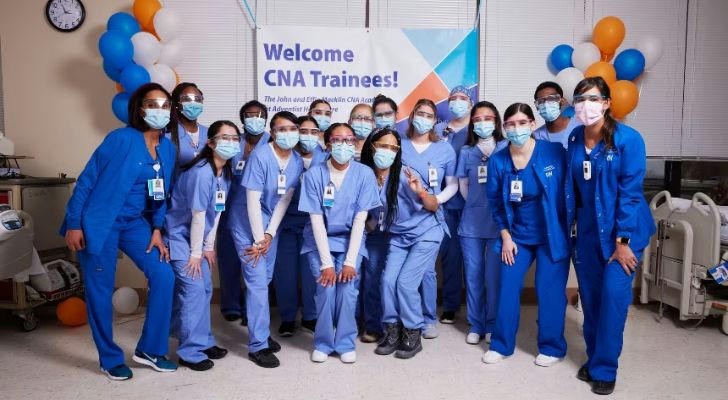📚 Comprehensive Guide to Online Certified Nursing Assistant (CNA) Programs
📢 Study CNA courses + obtain CNA certification=Flexibly Start Your Career in Healthcare
In the U.S., CNA online programs offer a flexible, affordable path into healthcare. Ideal for those balancing work, family, or other commitments, they provide the same core skills as in-person classes with added convenience. Some state-approved programs even include paid training, enabling students to earn while they learn.

💥 Advantages and Challenges of Online CNA Programs
🔹 Key Advantages of Online Learning
CNA online training delivers all theoretical coursework through online platforms, allowing students to access video lectures, reading materials, and quizzes from anywhere with an internet connection. Compared to traditional classrooms, the advantages include:
- Flexible scheduling – With 24/7 access, you can study in the morning, afternoon, or evening according to your schedule. For example, Johnson County Community College offers a four-week hybrid program with multiple time slots each week.
- Self-paced learning – Courses are divided into modules, and you can move to the next unit as soon as you finish the previous one, adjusting your learning pace to fit your needs.
- Interactive features – Platforms often include demonstration videos, chapter quizzes, and discussion forums to foster interaction with instructors and peers.
🔹 Hands-On Training and Official Certification
U.S. federal regulations require CNA training to include at least 75 hours in total, with a minimum of 16 hours of supervised hands-on clinical training. A typical process includes:
- Online theory – Covering basic patient care, first aid, safety protocols, and communication skills.
- Practical training – Completing required clinical hours in partner healthcare facilities or campus simulation labs.
- State examination – Passing a written knowledge test and a skills evaluation to be listed on the state’s Nurse Aide Registry and receive your CNA license.
🔹 Program Duration
Most state-approved CNA programs can be completed in 4–8 weeks for full-time learners, while part-time programs may extend to 12 weeks or longer.
| Program Type | Duration | Schedule |
|---|---|---|
| Full-time | 4–8 weeks | Weekdays, daytime |
| Part-time | 10–16 weeks (or longer) | Evenings, weekends |

📝 Certification Process for Online CNA Programs
1️⃣ Choose a program and meet prerequisites
Most require a high school diploma or equivalent. Some states may also require a physical exam, immunization records, and a background check.
2️⃣ Submit an online application
Complete the school’s application form and upload transcripts and health documents.
3️⃣ Pay tuition and register
Once payment is made, you will receive access credentials for the learning platform.
4️⃣ Attend online and in-person training
Finish all online modules, then participate in scheduled clinical practice sessions.
5️⃣ Schedule and take the state exam
Coordinated through your school or state nursing board, including both written and skills tests.
6️⃣ Obtain your CNA license
Upon passing, you’ll be listed in the state Nurse Aide Registry and receive your official CNA certificate.
❓ How to Find the Right CNA Program for You
When looking for “CNA classes near me” or “accredited CNA training online”, consider:
- State-approved educational institutions, community colleges, and vocational schools
- On-the-job training programs offered by local hospitals and nursing facilities
- Flexible, transparent-cost hybrid CNA programs (online + in-person)

📈 CNA Career Outlook and Workforce Demand
Due to an ongoing shortage of healthcare workers, CNA certification provides an important entry point into the medical field. According to U.S. Bureau of Labor Statistics data:
- By 2032, California alone is projected to have approximately 17,390 CNA job openings per year.
- By 2030, nationwide annual openings are expected to reach 192,800, with a growth rate of about 8%.
Common CNA work environments include:
- Hospital wards and emergency rooms
- Nursing homes and rehabilitation centers
- Home healthcare and community care
- Assisted living facilities
📊 Average CNA Salary in the U.S. and Suitable Candidate Profiles (Industry Estimates)
| Years of Experience | Average Annual Salary* | Suitable For |
|---|---|---|
| Entry-level (0–1 year) | $28,000 – $33,000 | Recent graduates, career changers, newly certified CNAs |
| Early career (1–3 years) | $30,000 – $35,000 | Those with some healthcare experience, seeking to build clinical skills |
| Mid-level (3–5 years) | $32,000 – $38,000 | Skilled in basic care, planning to advance to LPN/RN roles |
| Experienced (5–10 years) | $35,000 – $42,000 | Seeking stable roles with mentoring responsibilities |
| Highly experienced (10+ years) | $37,000 – $45,000 | Senior CNAs, nursing supervisors, or training instructors |
Salary ranges are based on publicly available industry data and are for general reference only. Actual salaries may vary by state, employer type, and individual experience.
💡 Next Step
If you’re ready to begin your healthcare career, first review your state’s CNA certification requirements. Then, choose a state-approved CNA online course to build the skills and qualifications needed for competitive job applications.
